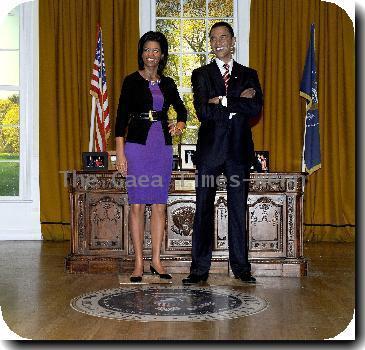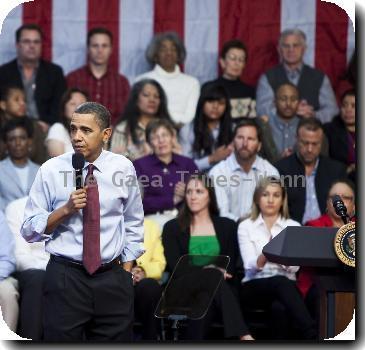10 NATO troopers killed on deadliest day this year for international forces in Afghanistan
By Rohan Sullivan, APMonday, June 7, 2010
10 NATO troopers killed on deadly Afghan day
KABUL, Afghanistan — Ten NATO service members, seven of them American, were killed in separate attacks Monday on the deadliest day of the year for foreign forces in Afghanistan. A U.S. civilian contractor who trains Afghan police also died in a suicide attack.
The bloodshed comes as insurgents step up bombings and other attacks ahead of a major NATO operation in the Taliban stronghold of Kandahar that Washington hopes will turn the tide of the war.
Half the NATO deaths — five Americans — occurred in a single blast in eastern Afghanistan, U.S. spokesman Col. Wayne Shanks said without giving further details. It was a grim reminder that the insurgents can strike throughout the country — not simply in the south, which has become the main focus of the U.S. campaign.
Two other U.S. service members were killed in separate attacks in the south — one in a bombing and the other by small arms fire.
NATO said three other service members were killed in attacks in the east and south but gave no further details. The French government announced that one of the victims was a sergeant in the French Foreign Legion who was killed by a rocket in Kapisa province northeast of Kabul. Three other Legionnaires were wounded.
The American police trainer and a Nepalese security guard were killed when a team of three suicide bombers attacked the main gates of the police training center in the southern city of Kandahar, U.S. officials said.
Afghan officials said one bomber blew a hole in the outer wall, enabling the two others to rush inside, where they were killed in a gunbattle. Afghan officials said three police were wounded.
It was the deadliest day for NATO since Oct. 26, when 11 American troops were killed, including seven who died in a helicopter crash in eastern Afghanistan. The crash was not believed a result of hostile fire.
U.S. commanders have warned of more casualties as the alliance gears up for a major operation to secure Kandahar, the former headquarters of the Taliban and the biggest city in the south with a half million people.
Last December, President Barack Obama ordered 30,000 U.S. troops to Afghanistan to try to stem the rise of the Taliban, who have bounced back since they were ousted from power in the 2001 U.S.-led invasion. Obama has shifted the focus of the U.S. campaign against Islamist terror to Afghanistan from Iraq, where the U.S. is expected to draw down to 50,000 troops by the fall.
As fighting escalates, the Afghan government is reaching out to the insurgents in hopes of ending the nearly nine-year war.
Last week, President Hamid Karzai won endorsement from a national conference, or peace jirga, for his plan to offer economic and other incentives to the militants to lay down their arms, and to seek talks with the Taliban leadership. The leadership has so far publicly shunned the offer, and the U.S. is skeptical whether peace can succeed until the Taliban are weakened on the battlefield.
The Taliban have branded Karzai a U.S. puppet and say there will be no talks while foreign troops are in Afghanistan.
Karzai’s decision Sunday to replace two of the country’s top security officials fueled speculation about divisions within the Afghan leadership over reaching out to the Taliban. The government said the two officials were replaced because of an armed attack on the peace jirga, which caused no casualties among the delegates but proved embarrassing to the Karzai administration.
Both officials had a long background of opposition to the Taliban.
Intelligence chief Amrullah Saleh was a senior figure in the Northern Alliance, which helped the U.S. oust the Taliban regime in 2001. Interior Minister Hanif Atmar served in Afghanistan’s Communist-era intelligence agency and fought mujahedeen opposed to the Soviet occupation.
In the wake of the shake-up, members of the former alliance, made up mostly of northern ethnic minorities, speculated that the changes were political and would weaken the security services at a key moment in the war.
“I would say it’s a hasty and irrational decision by a president of Afghanistan who has deprived his own government of professional capacity to combat the insurgency,” said Abdullah Abdullah, a key Northern Alliance leader and former foreign minister.
“The only party that will benefit is the Taliban,” Abdullah, who lost to Karzai in last year’s fraud-marred presidential election, told The Associated Press.
Karzai’s spokesman, Waheed Omar, insisted the security lapse was the only reason for the resignations.
“This could have been national chaos, a national crisis,” Omar told reporters of the jirga attack. “Somebody had to take responsibility for this.”
U.S. Defense Secretary Robert Gates, speaking to reporters on his way to London, said the security posts were for the Afghans to decide.
“I would just hope President Karzai will appoint in the place of those who have left people of equal caliber,” Gates said.
U.S. officials had singled Saleh and Atmar by name as examples of competent leadership in a government riven by corruption and patronage. Both Saleh and Atmar accompanied Karzai on a trip to Washington last month to patch up strained ties with Obama’s administration — a point that reinforced the surprise of Sunday’s announcement.
Associated Press Writers Amir Shah, Rahim Faiez, Heidi Vogt and Matthew Pennington in Kabul, Mirwais Khan in Kandahar, Robert Burns in Washington and Anne Gearan, traveling with U.S. Defense Secretary Robert Gates, contributed to this report.
Tags: Accidents, Afghanistan, As-afghanistan, Asia, Barack Obama, Central Asia, Kabul, Kandahar, Law Enforcement, North America, Police, Terrorism, Transportation, United States



